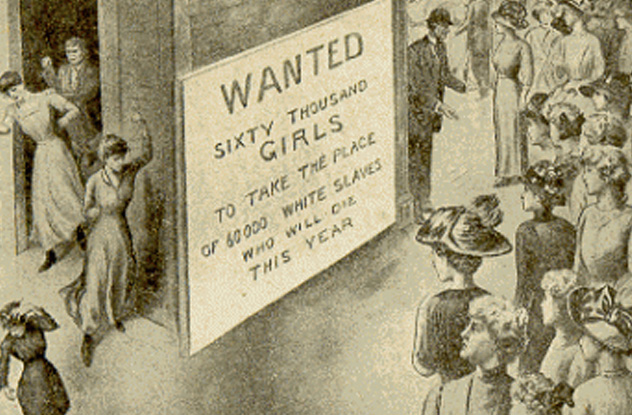 Movies and TV
Movies and TV  Movies and TV
Movies and TV  Animals
Animals 10 Clever Creatures That Don’t Have a Brain
 Crime
Crime 10 Evil Pastors Who Killed Their Family
 Politics
Politics 10 Politicians Who Beat a Future President
 Sport
Sport 10 Wild Facts about the Crazy First Years of the Tour de France
 Movies and TV
Movies and TV 10 Great Songs by Fictional Musicians in Movies
 Animals
Animals Ten Astonishing Stories about Underwater Life
 Weird Stuff
Weird Stuff 10 Strange and Unexpected Things Smuggled into Strict Authoritarian Countries
 Our World
Our World 10 Terrible Crimes That Are Destroying the Amazon
 Miscellaneous
Miscellaneous 10 Timely Stories about Clocks
 Movies and TV
Movies and TV 10 Actors Who Returned to Roles after a Long Absence
 Animals
Animals 10 Clever Creatures That Don’t Have a Brain
 Crime
Crime 10 Evil Pastors Who Killed Their Family
Who's Behind Listverse?

Jamie Frater
Head Editor
Jamie founded Listverse due to an insatiable desire to share fascinating, obscure, and bizarre facts. He has been a guest speaker on numerous national radio and television stations and is a five time published author.
More About Us Politics
Politics 10 Politicians Who Beat a Future President
 Sport
Sport 10 Wild Facts about the Crazy First Years of the Tour de France
 Movies and TV
Movies and TV 10 Great Songs by Fictional Musicians in Movies
 Animals
Animals Ten Astonishing Stories about Underwater Life
 Weird Stuff
Weird Stuff 10 Strange and Unexpected Things Smuggled into Strict Authoritarian Countries
 Our World
Our World 10 Terrible Crimes That Are Destroying the Amazon
 Miscellaneous
Miscellaneous 10 Timely Stories about Clocks
10 Outrageous Extortion Schemes
There are a lot of illegal ways to make money, but one of the most unusual methods is the act of extortion, coercing another party into paying you off. In some cases, extortion can be achieved with the threat of physical harm. In other cases, it involves blackmail and the threat of exposing a secret that could damage an individual’s reputation. Extortion is a particularly popular practice in the world of organized crime, where victims are often forced to pay “protection money” for the privilege of not being harmed. However, some people have attempted more unique methods of extortion in order to profit.
10 The Nonexistent Drug Dealers

Vern and Eleanor Egenes were an elderly couple from Bellevue, Washington with an adult daughter named Rondi. The couple was acquainted with private investigator Robert Neil Hassen, and in November 1988, he shared some shocking news with them: Rondi’s husband, Geoffrey Holm, was heavily involved in drugs and owed a $100,000 debt to a major dealer.
Geoffrey had been under investigation for years, said the investigator, and the Egeneses believed him because Hansen was an informant for the Drug Enforcement Administration. According to Hassen, Geoffrey’s drug debt was going to place Rondi’s life in serious danger, but he had a solution to this problem. Hassen knew a woman named Sherrie Curtis, who could offer 24-hour protection services by bringing in some special operatives to watch over Rondi.
The service would be costly, but Hassen had the Egeneses meet with a DEA supervisor, who convinced the couple that it would be a wise investment. The Egeneses wound up paying a total of $69,000 in protection money for their daughter. In actuality, Sherrie Curtis was Hassen’s sister, and the whole thing was a nothing more than a massive extortion scheme.
Geoffrey Holm was not involved in the drug scene at all, and Rondi’s life was never in any danger. The DEA supervisor who convinced the Egeneses to pay for protection services was woefully inexperienced and had been tricked by Hassen into giving bad advice.
After talking to their daughter and learning there was no truth to Hassen’s story, the Egeneses realized they were being scammed and went to the authorities. Hassen was charged with two counts of theft and was sentenced to two years in prison.
9 Autumn Jackson And Bill Cosby

Since their personal lives are always on display, it’s fairly common for famous celebrities to be targeted for extortion attempts. There have been numerous scandals where celebrities have carried on secret affairs and fathered illegitimate children. However, after playing a beloved father figure on television for years, one of the last celebrities the public expected to be involved in such a scandal was Bill Cosby.
On January 16, 1997, Cosby received word that a 22-year-old Las Vegas woman named Autumn Jackson was claiming to be his illegitimate daughter. Jackson was threatening to sell her story to the tabloids unless Cosby paid her $40 million. For Cosby, the timing couldn’t have been worse. He received this news on the exact same day he’d learned that his 27-year-old son, Ennis, had been murdered during an attempted robbery.
Nevertheless, Jackson met Cosby’s attorneys two days later. They negotiated a payoff of $24 million and signed an agreement. She was not aware that Cosby had contacted the authorities and that this so-called payoff arrangement was an FBI sting operation.
Jackson was arrested and charged with extortion. When the story went public, Cosby did confess to having a secret affair with Jackson’s mother during the 1970s. He’d even sent the family more than $100,000 over the years to keep them quiet. However, Cosby did not believe that Jackson was his biological daughter. When asked to take a paternity test to find out if Cosby was her father, Jackson refused. Jackson’s claims were never proven. She was convicted of extortion and sentenced to 26 months in prison.
8 Buda Godman Exploits The Mann Act

In 1910, the United States established a federal law known as the Mann Act, which made it a felony to transport women across state lines for prostitution—or, as the law initially put it, “immoral purpose.” Its wording was so ambiguous that a person could conceivably be prosecuted for an act of consensual sex. As a result, blackmailers and extortionists often dreamed up schemes to use the Mann Act to their advantage.
During the early 20th century, Buda Godman worked as a singer and an actress, but when it became apparent her career wasn’t going anywhere, she became involved in a blackmail ring. In 1916, Godman was in Chicago and approached wealthy business executive Edward R. West. After introducing herself as “Alice Williams,” Godman seduced West and convinced him to travel with her to New York City.
After the couple checked into the Ansonia Hotel, two of Godman’s associates suddenly burst into the room. They pretended to be federal agents and told West that he was under arrest for transporting Godman across state lines and violating the Mann Act. After taking West back to Chicago, the phony agents told him that they were willing to make an arrangement. They would drop the charges and forget the incident ever happened if he forked over $15,000.
West paid them off, but his suspicions later compelled him to go to the authorities and tell them what happened. Godman and her associates in the blackmail ring were arrested, but she was released and skipped town after some friends posted a $10,000 bail. While Godman was never convicted on the blackmail charges, she did eventually serve time in prison for her involvement in a 1932 jewelry robbery.
7 The Sears Terrorist’s Homemade Submarine

On July 23, 1940, Milwaukee circuit judge William F. Shaughnessy found a bizarre extortion note on his front porch. The note threatened to set off a bomb inside a local Sears store unless he paid a $100,000 ransom. The confused Shaughnessy turned the note over to the police. Its intended recipient was actually Rowland H. Davie, who managed all the Sears stores in Milwaukee and had previously lived in Shaughnessy’s house.
One day later, a small bomb did go off inside a Sears store on North Avenue, but the blast caused minimal damage, and no one was harmed. Davie started receiving more extortion notes, demanding that he charter a plane and drop a money bundle containing $100,000 over a designated spot in Lake Michigan. If Davie did not comply, the next Sears store bombing would be much bigger.
An investigation of the bombing uncovered some metal fragments ordinarily used in ornamental iron work. Suspicion turned toward German immigrant Walter Minx, who owned a local ornamental iron shop and had previously done some work at the Sears store. When police searched Minx’s shop, they found scrap metal which matched the fragments found with the bomb. Minx soon confessed to the bombing and extortion scheme, which he had dreamed up with his brother.
There was a reason Minx had demanded that the money be dropped in Lake Michigan. He had gone to the trouble of building a 2-meter (7 ft) mini-submarine for himself. Minx would be submerged in the water when the money bundle dropped from the plane, giving him a better chance of escape after he collected the ransom.
Walter and Kurt Minx were both convicted of attempted extortion.
6Serial Killer Blackmails People For His Own Crimes

The Scottish-born serial killer Thomas Neill Cream poisoned several victims in both the United States and England, but one aspect of Cream’s murder spree that set him apart was his penchant for blackmail. He often tried extorting money from innocent people by falsely implicating them in his murders.
In 1881, Cream was working as a physician in Chicago, poisoning his victims by putting strychnine in their medicine. After being charged with murder, Cream was sentenced to life imprisonment, but thanks to his influential brother, he secured an early release. In 1891, Cream moved to London and took up lodgings on Lambeth Palace Road. He poisoned more victims, but this time, he sent extortion notes to prominent individuals to blackmail them for his deeds.
Member of Parliament Frederick Smith soon received a note claiming he had murdered a woman named Ellen Donworth, and Cream had evidence. After poisoning two other women, Cream sent another extortion note to a prominent physician, claiming the physician’s son was responsible but Cream would destroy the evidence for £1,500.
Cream’s downfall came when he extorted another physician, William Broadbent, over poisoning victim Matilda Clover. Clover’s death had till this point been attributed to natural causes, so when Broadbent turned the note over to the police, this tipped them off that a serial killer was responsible. They tied Cream to the notes and arrested him for blackmail, until they found enough evidence to charge him with murder. On November 15, 1892, the killer known as “The Lambeth Poisoner” was hanged.
5A Husband Blackmails His Wife’s Lovers

Ted and Mary Roberts were a San Antonio couple who had three kids and both worked as attorneys. They were not likely candidates to mastermind an elaborate blackmail scheme, but the seeds were planted in 2001 when Mary had affairs with five different men. Ted became suspicious and hired a private investigation firm to uncover evidence of his wife’s infidelity.
While Ted was initially angry, he ultimately decided to use the situation to his advantage. Ted told one of his investigators that he was planning to confront all of Mary’s lovers, saying: “They’d better bring a checkbook because they’re going to be writing a check to my favorite charity: me.” All of these men were married and had prominent careers, so they had a lot to lose if their secret affairs were revealed.
Ted used his legal knowledge to exploit an obscure Texas provision called Rule 202, which allows an attorney to file a deposition for any civil suit. Even if the suit had no merit, the details of the case would still become public record, a prospect which terrified Mary’s lovers. Ted did not actually file any depositions, but he typed up some fake “Petition to Investigate Potential Claims” documents containing all the sordid details of Mary’s affairs. When Mary presented these documents to her former lovers, Ted shook them down for money in exchange for not filing the alleged petitions.
The couple managed to extort a total of $155,000. However, the scheme ended when Ted’s law partner uncovered copies of the fake petitions and turned them over to the authorities. The couple was charged with blackmail and extortion. Ted received five years in prison, and Mary received 10 years of probation.
4 Peter Macari’s Bomb Hoax

On May 26, 1971, Qantas, the biggest airline carrier in Australia, received a call from a man calling himself “Mr. Brown.” He claimed that a bomb had been planted on a Qantas flight bound for Hong Kong, and he would detonate it if they did not pay him $500,000. To prove he was serous, Mr. Brown even directed the authorities to an airport locker containing another bomb.
The airline agreed to pay the ransom, which Mr. Brown collected in front of their head office in Sydney. Qantas later received a phone call from the perpetrator, telling them there was no bomb aboard the plane. The threat had been a hoax.
Months later, authorities tracked down a suspect named Raymond Poynting, who had attracted attention with his lavish purchases. Poynting directed the police toward the plot’s mastermind: British criminal Peter Macari. Police found $138,000 of the ransom stashed in Macari’s house, and he was soon arrested. He was sentenced to 15 years in prison and eventually deported back to Britain.
However, there are still a few unresolved mysteries in this case. Over $238,000 of the ransom money was never recovered. And after receiving the ransom, Macari took over the identity of a British man named William Day, using his name to buy a Jaguar and open numerous bank accounts. Day’s family never heard from the man after 1970. To this day, William Day remains missing, and it’s theorized that Macari murdered him.
3 Elvis’s Gay Skin Specialist

Celebrities are a popular target for extortion schemes, and there’s never been a bigger celebrity in the world than Elvis Presley. In fact, the FBI kept a 683-page file on Elvis, detailing the numerous complaints, death threats, and extortion attempts that he faced throughout his life.
Elvis’s most unusual documented case of extortion involved a South African dermatologist named Laurenze Johannes Griessel-Landau. In 1959, Elvis was serving in the military and stationed in Bad Nauheim, Germany. He had seen an ad where Griessel-Landau advertised his expertise as a skin specialist and decided to hire his services. Griessel-Landau showed up in Bad Nauheim on November 27 and spent the next month performing his specialized skin treatments on Elvis.
While many of Elvis’s associates thought Griessel-Landau a fraud, Elvis seemed to think the skin treatments were helping him. However, Griessel-Landau allegedly made homosexual advances toward Elvis’s friends, and when Elvis learned about this, he fired him. This prompted Griessel-Landau to attempt an extortion scheme. He claimed to have photographs and tape recordings of Elvis in “compromising situations” and threatened to reveal them to the world if he was not compensated.
Elvis’s handlers believed this could potentially ruin the singer’s career, and Elvis convinced Griessel-Landau to accept a $200 payment and plane fare to London. Griessel-Landau soon reneged on their original deal and demanded more money. No one knows for sure if Griessel-Landau actually had any dirt on Elvis or what kind of arrangement was ultimately made with him, but after departing on a plane to London in January 1960, he was not heard from again.
2 The Tesco Bombing Campaign
In August 2000, Tesco, the most popular supermarket chain in Great Britain, became the target of a truly bizarre extortion scheme. That month, the Dorset Police and the Bournemouth Daily Echo newspaper received letters from an unidentified writer named “Sally,” who was threatening to send letter bombs to Tesco customers. Instead of a cash ransom, Sally demanded Tesco Clubcards, which would be specifically coded to make constant cash withdrawals from ATMs.
Approximately one month later, an elderly couple was injured by a letter bomb after finding a package outside their Bournemouth home. For the next several months, Sally continued sending letters to the police, threatening to set off bombs throughout Bournemouth unless her demands were met.
Amusingly enough, even though Sally mailed other packages containing letter bombs, they wound up intercepted because she put insufficient postage on them. To add to the incompetence, Sally left one of her letters in a newsagent photocopier. Since Sally had already mailed off a copy of the letter to the authorities, she tried to prevent them from receiving it by setting fire to the post box she used. The arson attempt was unsuccessful, and this prompted police to set up surveillance at the post box.
In February 2001, a man named Robert Dyer was identified mailing a letter on the surveillance footage. After visiting Dyer’s home to question him, police found an extortion note typed up on his computer. Sure enough, at virtually the exact same time, police received another extortion note from “Sally,” and it was an exact match to the note on Dyer’s computer. Dyer was found guilty of nine counts of blackmail and one count of common assault and was sentenced to 16 years in prison.
1 The First Major American Sex Scandal

Alexander Hamilton was one of the Founding Fathers of the United States and served as the country’s first Treasury Secretary. He is also infamous for being involved in America’s first big sex scandal.
In the summer of 1791, 23-year-old Maria Reynolds showed up at Hamilton’s Philadelphia home while his family was away on vacation. Maria claimed that her husband James had abandoned her and that she needed money to return to her family in New York. Hamilton agreed to help Maria, but it wasn’t long before the two of them began an affair. Months later, Hamilton received a note from James Reynolds, who was anxious to use his wife’s affair for extortion purposes.
Over the next three years, James threatened to expose the affair and ruin Hamilton’s reputation if he did not send frequent payments. James extorted over $1,000 from Hamilton and actually allowed him to keep seeing Maria as long as the money kept coming in.
However, the situation became more complicated in November 1792, when James was arrested for forgery. He hoped to use Hamilton’s influence to escape his legal troubles, but Hamilton had had enough. He confessed his affair to Congressional investigators and presented them with love letters he had received from Maria.
The affair still might have remained secret from the public, but Hamilton’s biggest adversary, Thomas Jefferson, got a hold of the love letters. In 1797, they found their way into a political publication, forcing Hamilton to make a full public confession about the affair. In a twist of fate, Alexander Hamilton was killed in an 1804 duel with Aaron Burr—who served as Maria Reynolds’s attorney when she divorced her husband.
Robin Warder is a budding Canadian screenwriter who has used his encyclopedic movie knowledge to publish numerous articles at Cracked.com. He is also the co-owner of a pop culture website called The Back Row and recently worked on a sci-fi short film called Jet Ranger of Another Tomorrow. Feel free to contact him here.





